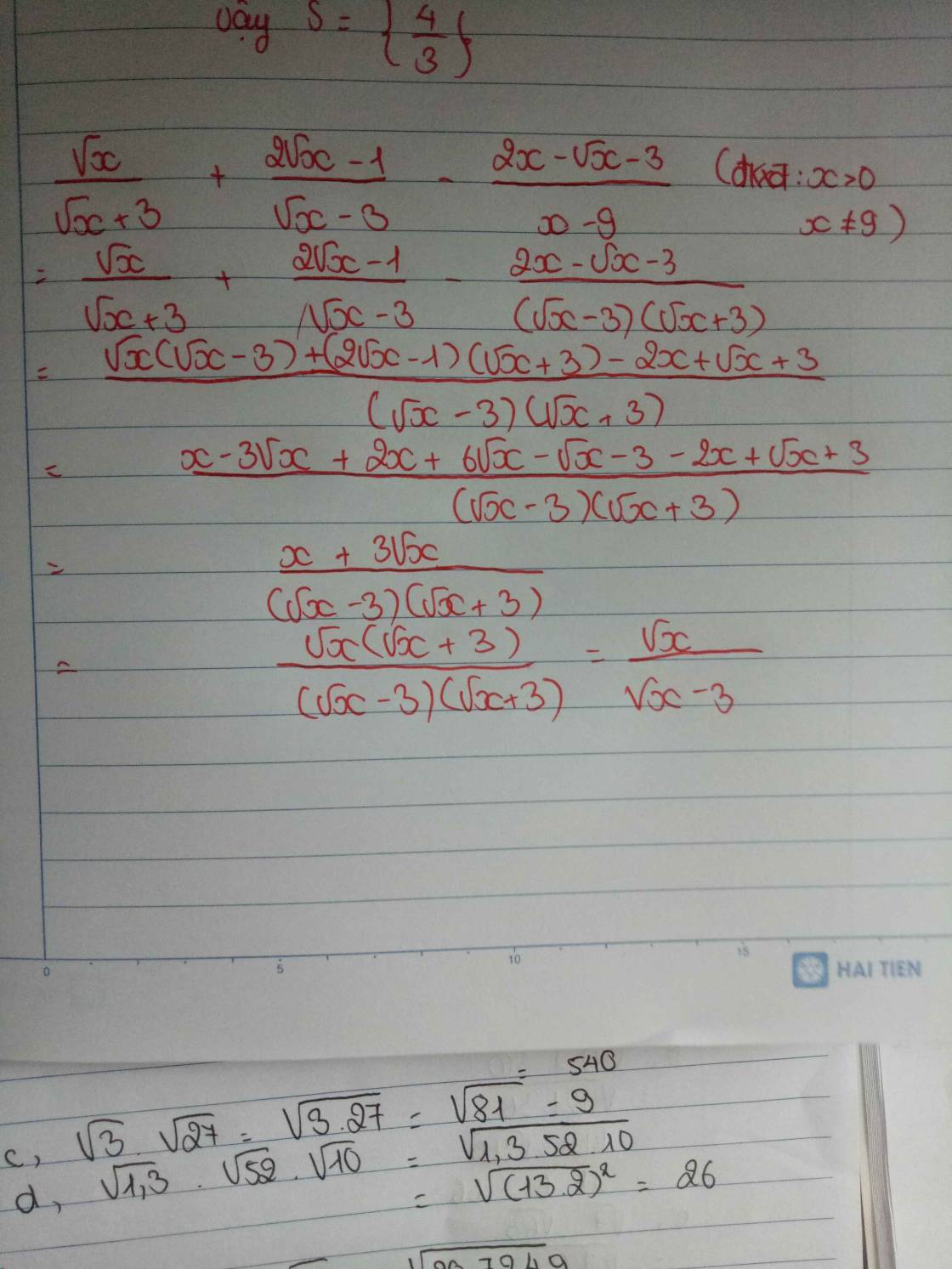
Hãy nhập câu hỏi của bạn vào đây, nếu là tài khoản VIP, bạn sẽ được ưu tiên trả lời.


\(\dfrac{\sqrt{x}}{\sqrt{x}+3}+\dfrac{2\sqrt{x}-1}{\sqrt{x}-3}-\dfrac{2x-\sqrt{x}-3}{x-9}\) (ĐK: \(x\ge0;x\ne9\))
\(=\dfrac{\sqrt{x}\left(\sqrt{x}-3\right)}{\left(\sqrt{x}-3\right)\left(\sqrt{x}+3\right)}+\dfrac{\left(2\sqrt{x}-1\right)\left(\sqrt{x}+3\right)}{\left(\sqrt{x}-3\right)\left(\sqrt{x}+3\right)}-\dfrac{2x-\sqrt{x}-3}{\left(\sqrt{x}+3\right)\left(\sqrt{x}-3\right)}\)
\(=\dfrac{\text{x}-3\sqrt{x}+2x+6\sqrt{x}-\sqrt{x}-3-2x+\sqrt{x}+3}{\left(\sqrt{x}+3\right)\left(\sqrt{x}-3\right)}\)
\(=\dfrac{x+3\sqrt{x}}{\left(\sqrt{x}+3\right)\left(\sqrt{x}-3\right)}\)
\(=\dfrac{\sqrt{x}\left(\sqrt{x}+3\right)}{\left(\sqrt{x}+3\right)\left(\sqrt{x}-3\right)}\)
\(=\dfrac{\sqrt{x}}{\sqrt{x}-3}\)

Đặt \(\hept{\begin{cases}\sqrt{3+x}=a\\\sqrt{6-x}=b\end{cases}}\)
Ta có a2 + b2 = 9
a + b - ab = 3
Tới đâu thì bài toán đơn giản rồi nên bạn tự làm nha

Mình làm câu 2 trước nhé:
đkxđ: \(\dfrac{1}{2}< x\le2\)
Áp dụng BĐT Bunyakovsky, ta có \(VT=\left(1.\sqrt{x}+1.\sqrt{2-x}\right)\)\(\le\sqrt{\left(1^2+1^2\right)\left[\left(\sqrt{x}\right)^2+\left(\sqrt{2-x}\right)^2\right]}\) \(=2\). ĐTXR \(\Leftrightarrow x=2-x\Leftrightarrow x=1\) (nhận). Vậy \(VT\le2\) (1)
Mặt khác, ta có \(\left(x-1\right)^2\ge0\) \(\Leftrightarrow x^2-\left(2x-1\right)\ge0\) \(\Leftrightarrow\left(x-\sqrt{2x-1}\right)\left(x+\sqrt{2x-1}\right)\ge0\). Do \(x+\sqrt{2x-1}>0\) nên điều này có nghĩa là \(x\ge\sqrt{2x-1}\) \(\Rightarrow\dfrac{x}{\sqrt{2x-1}}\ge1\) \(\Leftrightarrow\dfrac{2x}{\sqrt{2x-1}}\ge2\) hay \(VP\ge2\) (2). ĐTXR \(\Leftrightarrow x=1\) (nhận)
Từ (1) và (2) suy ra \(VT\le2\le VP\), do đó pt đã cho \(\Leftrightarrow VT=VP\) \(\Leftrightarrow x=1\)
Vậy pt đã cho có nghiệm duy nhất \(x=1\)

a/ Đặt \(\sqrt[3]{x+5}=a\); \(\sqrt[3]{x+6}=b\)
Từ đó PT <=> a + b = \(\sqrt[3]{a^3+b^3}\)
<=> a3 + b3 + 3ab(a+b) = a3 + b3
<=> 3ab(a+b) = 0
<=> a = 0 hoặc b = 0
Thế vào giải ra là tìm được nghiệm

a, \(\sqrt{2x^2-3}=\sqrt{4x-3}\) (x \(\ge\) \(\sqrt{\dfrac{3}{2}}\))
Vì hai vế ko âm, bp 2 vế ta được:
2x2 - 3 = 4x - 3
\(\Leftrightarrow\) 2x2 = 4x
\(\Leftrightarrow\) x2 = 2x
\(\Leftrightarrow\) x2 - 2x = 0
\(\Leftrightarrow\) x(x - 2) = 0
\(\Leftrightarrow\) \(\left[{}\begin{matrix}x=0\\x-2=0\end{matrix}\right.\Leftrightarrow\left[{}\begin{matrix}x=0\left(KTM\right)\\x=2\left(TM\right)\end{matrix}\right.\)
Vậy S = {2}
b, \(\sqrt{2x-1}=\sqrt{x-1}\) (x \(\ge\) 1)
Vì hai vế ko âm, bp 2 vế ta được:
2x - 1 = x - 1
\(\Leftrightarrow\) x = 0 (KTM)
Vậy x = \(\varnothing\)
c, \(\sqrt{x^2-x-6}=\sqrt{x-3}\) (x \(\ge\) 3)
Vì hai vế ko âm, bp 2 vế ta được:
x2 - x - 6 = x - 3
\(\Leftrightarrow\) x2 - 2x - 3 = 0
\(\Leftrightarrow\) x2 - 3x + x - 3 = 0
\(\Leftrightarrow\) x(x - 3) + (x - 3) = 0
\(\Leftrightarrow\) (x - 3)(x + 1) = 0
\(\Leftrightarrow\) \(\left[{}\begin{matrix}x-3=0\\x+1=0\end{matrix}\right.\Leftrightarrow\left[{}\begin{matrix}x=3\left(TM\right)\\x=-1\left(KTM\right)\end{matrix}\right.\)
Vậy S = {3}
d, \(\sqrt{x^2-x}=\sqrt{3x-5}\) (x \(\ge\) \(\dfrac{5}{3}\))
Vì hai vế ko âm, bp 2 vế ta được:
x2 - x = 3x - 5
\(\Leftrightarrow\) x2 - 4x + 5 = 0
\(\Leftrightarrow\) x2 - 4x + 4 + 1 = 0
\(\Leftrightarrow\) (x - 2)2 + 1 = 0
Vì (x - 2)2 \(\ge\) 0 với mọi x \(\ge\) \(\dfrac{5}{3}\) \(\Rightarrow\) (x - 2)2 + 1 > 0 với mọi x \(\ge\) \(\dfrac{5}{3}\)
\(\Rightarrow\) Pt vô nghiệm
Vậy S = \(\varnothing\)
Chúc bn học tốt!

Ta có:
\(A=3.1.\sqrt{2x-1}+x\sqrt{5-4x^2}\)
Áp dụng bất đẳng thức Cô-si cho các cặp số \(1,\sqrt{2x-1}\)và \(x,\sqrt{5-4x^2}\)không âm, ta có:
\(A=3.1.\sqrt{2x-1}+x\sqrt{5-4x^2}\le3.\frac{1+2x-1}{2}+\frac{x^2+5-4x^2}{2}=\frac{-3x^2+6x+5}{2}\)
\(=-\frac{3}{2}.\left(x^2-2x-\frac{5}{3}\right)=-\frac{3}{2}\left(x^2-2x+1\right)+4=-\frac{3}{2}\left(x-1\right)^2+4\le4\)
" =" xảy ra <=> \(\hept{\begin{cases}1=\sqrt{2x-1}\\x=\sqrt{5-4x^2}\\\left(x-1\right)^2=0\end{cases}}\Leftrightarrow x=1\)thỏa mãn
Vậy maxA=4 khi và chỉ khi x=1

\(Pt\Leftrightarrow\left(x^3+4x^2+3x\right)+3\left(x+2-\sqrt[3]{2x^2+9x+8}\right)=0.\)
\(\Leftrightarrow\left(x^3+4x^2+3x\right)+3.\frac{\left(x+2\right)^3-2x^2-9x-8}{\left(x+2\right)^2+\left(x+2\right)\sqrt[3]{2x^2+9x+8}+\sqrt[3]{\left(2x^2+9x+8\right)^2}}=0\)
\(\Leftrightarrow\left(x^3+4x^2+3x\right)+3.\frac{x^3+4x^2+3x}{MS}=0\Leftrightarrow\left(x^3+4x^2+3x\right)\left(1+\frac{3}{MS}\right)=0\)
Dễ thấy MS >0 \(\Rightarrow PT\Leftrightarrow x^3+4x^2+x=0\Leftrightarrow x\left(x^2+4x+3\right)=0\Leftrightarrow\orbr{\begin{cases}x=0\\x^2+4x+3=0\Leftrightarrow\orbr{\begin{cases}x=-1\\x=-3\end{cases}}\end{cases}}\)
\(\Rightarrow Pt\Leftrightarrow x^3+4x^2+3x=0\Leftrightarrow x\left(x^2+4x+3\right)=0\Leftrightarrow\orbr{\begin{cases}x=0\\x^2+4x+3=0\Leftrightarrow\orbr{\begin{cases}x=-1\\x=-3\end{cases}}\end{cases}}\)\(\Rightarrow PT\Leftrightarrow x^3+4x^2+3x=0\)<=>\(x\in\left\{-3;-1;0\right\}\)

đề có sai ko nhỉ xài đủ pp mà vừa lẻ vừa xấu hết
Đề đúng nhé các bạn. Bài này phải sử dụng pp hàm số mới đc. có thể vô ngiệm hoặc nghiệm xấu đấy